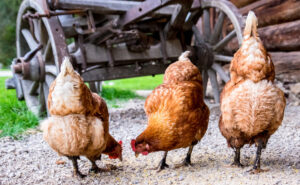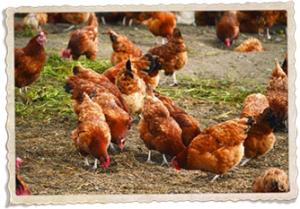Raising healthy backyard chickens requires understanding their dietary needs. Different stages of life require different types of feed, so let’s delve into the chicken nutrition basics and break down what you should be feeding your flock at each stage of their lives.
The First Days: Baby Chicks
When chicks first hatch, they need a diet rich in protein to kick-start their growth. Start them on a specially formulated chick starter feed, which typically contains about 18-20% protein. This should make up the entirety of their diet for the first six weeks.
Growing Up: The Pullet Stage
Once your chicks reach six weeks of age, they transition into their “teenage” phase, known as the pullet stage for females and the cockerel stage for males. During this time, switch their feed to a grower formula, which contains around 16-18% protein and a balanced ratio of other essential nutrients. You should feed this until they’re about 20 weeks old or until the hens start laying eggs.
The Laying Stage: Adult Hens
When your hens start laying eggs, it’s time to switch to a layer feed. This type of feed contains around 16% protein and a higher concentration of calcium, which is critical for eggshell production. If your flock consists of both layers and non-layers, use an all-flock feed and provide a separate source of calcium, like crushed oyster shells, for the laying hens.
Mature Roosters and Non-Laying Hens
Roosters and non-laying hens do well on a maintenance feed, which typically contains about 14-16% protein. If they’re housed with laying hens, they can eat layer feed, but remember that excess calcium can be harmful to non-layers over time.
Treats and Supplements
While commercial feeds are designed to meet most of your chickens’ nutritional needs, occasional treats and supplements can contribute to their diet. Fruits, vegetables, and grains can be a healthy treat, but should make up no more than 10% of your chickens’ diet.
Grit is an essential supplement for chickens, as it helps them grind down food in their gizzard. Provide a separate container of grit, especially if your chickens don’t have access to the ground.
Nutrition is a critical component of raising healthy chickens. By providing the right feed for each stage of life, you’ll ensure your flock gets the nutrients they need to thrive. Always remember to provide plenty of clean, fresh water alongside their feed, as hydration is equally important to their health.
At Chickens for Backyards, we’re passionate about helping you care for your flock in the best possible way. From choosing the right breeds to understanding their nutritional needs, we’re here to assist you. Check out our website for more helpful tips and a range of chickens perfect for any backyard setup.

